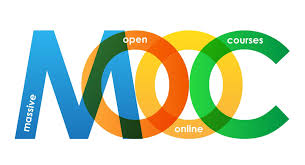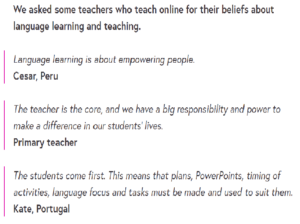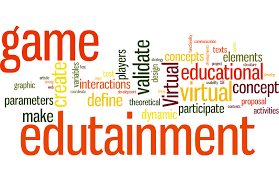My MOOC experience

My MOOC experience
I joined a FutureLearn MOOC: Teaching Young Learners Online, run by the British Council. There are 37,868 people enrolled on the course and the course is projected to last 3 weeks, with 3 hours of work a week expected. The course is aimed at English Teachers and is run by two ‘Educators’. Interestingly, one is based in Beirut and the other in Spain, which made me think of the global nature of our learning spaces. I chose to do this course as I deliberately wanted to do one that teaches a skill set in which I am already experienced. I wanted to be able to make a professional judgement on the level of knowledge required and assess how challenging and/or helpful the course content would be. Had I chosen a scientific course, I wouldn’t have been able to comment in the same way.

A screenshot from MOOC: Teaching Young Learners Online – comments from initial ‘forum’, intended to generate collaboration.
Having no prior experience of joining a MOOC, I was impressed by the simplicity of the critical pathways that had been set up. I was very much guided in a step by step manner, to click on relevant buttons and how to fill in my initial comment. This was clearly meant to make me feel part of a cohesive learning community, along the lines of the vision of open education where peer learning can work to enhance knowledge acquisition. (Brown et al 2008). However, this assumption that providing a forum platform results in interaction did not seem to bear fruit.
Fellow learners were posting generalised and simplistic statements rather than provocative questions which would have perhaps enabled some sort of collaboration. From the very outset, there was an autonomy of the individual within the MOOC, rather a social process, so, in my opinion, a backfiring of the intended purpose of the system. Brown et al (2008) describes the value of the ‘humanistic spirit of communal and collaboratively playful learning’, which is arguably something that open education should be provoked to enable. The value of social processes and networks is fundamental to meaningful education, whether it is traditional or a modern MOOC.
 Whether I was being presented with ‘deep knowledge’ is a moot point. The content provided was certainly solid, but as Cottom at this point in her keynote speech said, there is a fundamental difference between content and knowledge and without social processes within education, content does not turn into knowledge. My MOOC presented an essentialist perspective of assuming an immediate association between technical systems and pedagogical strategies, which harkens back to Hamilton & Friesen (2013).
Whether I was being presented with ‘deep knowledge’ is a moot point. The content provided was certainly solid, but as Cottom at this point in her keynote speech said, there is a fundamental difference between content and knowledge and without social processes within education, content does not turn into knowledge. My MOOC presented an essentialist perspective of assuming an immediate association between technical systems and pedagogical strategies, which harkens back to Hamilton & Friesen (2013).
What was impressive, from the very outset was the access to a rhizome-like (to that metaphor again) web of content. Knox (2013: page 2) talks of the role of teaching being often overlooked within the rollout of open education and that the purpose of the MOOC has become one of bringing the learner into contact with supplies of knowledge. That was certainly the case with my MOOC: Teaching Young Learners Online. I moved rapidly between snippets of video and links to blogs and educational websites.
 There is also an element of ‘video edutainment’ (Moe 2015 ‘OER as online edutainment resources: a critical look at open content, branded content, and how both affect the OER movement’), with a proliferation of free-to-view videos. None of the videos are ever much more than a few minutes long, which made me think of how there is an assumption that the modern MOOC learner does not have a long attention span. I enjoyed the easily digestible links and the course did not feel like hard work.
There is also an element of ‘video edutainment’ (Moe 2015 ‘OER as online edutainment resources: a critical look at open content, branded content, and how both affect the OER movement’), with a proliferation of free-to-view videos. None of the videos are ever much more than a few minutes long, which made me think of how there is an assumption that the modern MOOC learner does not have a long attention span. I enjoyed the easily digestible links and the course did not feel like hard work.
I was disappointed that the free version of the MOOC whilst allowing me access to the educational content of the course, precluded the ability to sit assessments or receive a certificate; I would have to pay in order to access these privileges.
Was my MOOC worth anything? It was interesting in terms of opening up a network of easily consumable information. This information was cleverly packaged and easily absorbed. It could give inspiration to a teacher seeking ideas to implement ‘best practice’. Would it enable promotion or further my professional development? No, not particularly, but perhaps if I was an aspiring teacher, struggling in a workplace where I had no hands-on support, it would be an absolute godsend.
my experience of joining a MOOC allow me to acquire deep knowledge or will it be productive inquiry and peer-based learning?
Will I be expected to rely in the logic of self-direction, will there be a de-emphasis of teacher contact will my experience be one of isolation
will there be cohesive community learning
So, to delve deeper…




It is interesting that these formal MOOCs appear to really struggle with getting much interaction and dialogue going – compares to some of the alternative MOOCs such as CCK08, Rhizo 15 or ds106 (described in the Jim Groom video) . Its also increasingly less common that learners are sent outside the walled garden of the MOOC platform as happened in this case. Your point about the video durations is an interesting one – should we be training learners to have longer attention spans or be responsive to the available evidence that engagement with education videos drops off significantly after about 8 minutes or so? Would you think the main value of a MOOC like this for a practicing teacher is in providing a sense of being ‘not alone’ – to give some sense of being part of an imagined community?